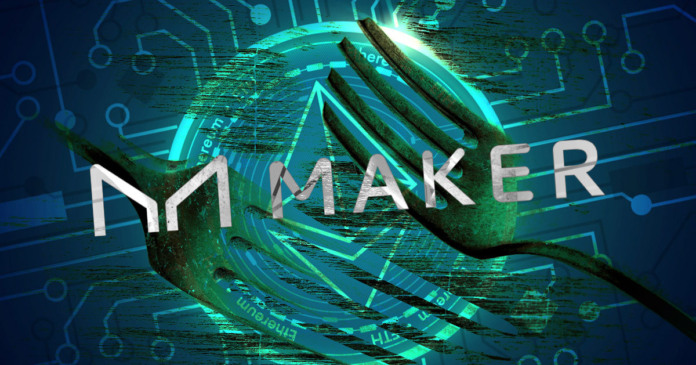DeFi protocol MakerDAO (MKR) has identified seven risks its protocol faces if Ethereum (ETH) is forked.
Futures backwardation and negative funding
According to the protocol, the first risk it faces is future backwardation and negative funding.
In this case, while spot ETH will get forked PoW tokens, those exposed to ETH perpetual contracts and quarterly futures would not.
1️⃣ Futures Backwardation & Negative Funding.
Spot ETH would receive PoW forked tokens, while exposure to ETH quarterly futures or perpetual contracts would not.
4/
— Maker (@MakerDAO) August 5, 2022
If this happens, it could cause a decline in the cost of leverage through futures contracts which will create competitive pressure on Maker vaults.
stETH discount
An Ethereum PoW hard fork post-Merge might lead to a stETH discount because staked coins are likely to become worthless.
Staked Ethereum is locked in and expected to be unlocked after the network upgrades to Ethereum 2.0.
2️⃣ stETH Discount
stETH is likely to become worthless on any PoW Ethereum fork.
This is because further chain upgrades would be required to unlock staked ETH from the deposit contract, and there is arguably little economic incentive for the fork chain to accommodate this
11/
— Maker (@MakerDAO) August 5, 2022
But with a PoW hard fork, these staked coins would become worthless as they would remain locked until a network upgrade is done.
The above may result in stETH’s value declining based on the expected value of the forked PoW ETH. For Maker, that represents a higher risk of stETH liquidity risks and downside volatility.
Additionally, a discount in liquid staking assets could incentivize leveraged staking behavior, increasing the “risk of negative price gaps while raising ETH supply rates on lending protocols.”
External assets
A forked Ethereum presents a challenge for external assets operating on the network. A fork would force centralized stablecoin issuers, cross-chain bridges, and others to pick an Ethereum chain.
3️⃣ External Asset Fork Choice
Ethereum hosts a broad variety of externally backed assets.
This includes cross-chain bridges, centralized stablecoins, and real-world assets.
17/
— Maker (@MakerDAO) August 5, 2022
While some, like Chainlink (LINK), has expressed support for the Merge, there is the possibility that others could recognize ETH forks, given the level of traction it has gained recently.
Such actions may make their asset bridged into or out of Ethereum worthless, and any protocol that accepts such assets as collateral could have significant liquidity issues.
Liquidity pool protocols
Another challenge the protocol faces is the issue that faces liquidity pool protocols if Ethereum is forked.
1️⃣ Liquidity Pool Protocols.
A significant subset of assets would become worthless in the hypothetical forked chain.
This could cause insolvency in lending markets, and incentivize users to borrow all available ETH as the asset most likely to retain some post-fork value.
4/
— Maker (@MakerDAO) August 8, 2022
According to the DeFi protocol, a significant number of assets could become useless if the network is forced, leading to insolvency in the lending market.
Other risks
Additionally, the protocol faces other risks like oracle networks supplying bad data or network downtime during the Merge period, which could cause insolvency or liquidation for Maker vaults. Replay attacks could become more prevalent on both the mainnet and PoW chains.
This thread is focused on the following potential fork risks that could impact Maker:
1️⃣ Liquidity Pool Protocols.
2️⃣ Oracle Networks and Indices.
3️⃣ Network Downtime.
4️⃣ Replay Attacks.
3/
— Maker (@MakerDAO) August 8, 2022
However, Maker has also identified ways to minimize these risks in the post. Most of the responses to the risk rely on communicating information about the risks to users.
Credit: Source link






















 Bitcoin
Bitcoin  Ethereum
Ethereum  Tether
Tether  Solana
Solana  XRP
XRP  Dogecoin
Dogecoin  USDC
USDC  Lido Staked Ether
Lido Staked Ether  Cardano
Cardano  TRON
TRON  Avalanche
Avalanche  Shiba Inu
Shiba Inu  Wrapped stETH
Wrapped stETH  Wrapped Bitcoin
Wrapped Bitcoin  Toncoin
Toncoin  Sui
Sui  WETH
WETH  Bitcoin Cash
Bitcoin Cash  Chainlink
Chainlink  Pepe
Pepe  Polkadot
Polkadot  LEO Token
LEO Token  Stellar
Stellar  NEAR Protocol
NEAR Protocol  Litecoin
Litecoin  Aptos
Aptos  Wrapped eETH
Wrapped eETH  Uniswap
Uniswap  USDS
USDS  Cronos
Cronos  Hedera
Hedera  Internet Computer
Internet Computer  Ethereum Classic
Ethereum Classic  Bonk
Bonk  Bittensor
Bittensor  Render
Render  Ethena USDe
Ethena USDe  POL (ex-MATIC)
POL (ex-MATIC)  WhiteBIT Coin
WhiteBIT Coin  Dai
Dai  MANTRA
MANTRA  Artificial Superintelligence Alliance
Artificial Superintelligence Alliance  Arbitrum
Arbitrum  dogwifhat
dogwifhat  Monero
Monero  Stacks
Stacks  Filecoin
Filecoin  OKB
OKB 
